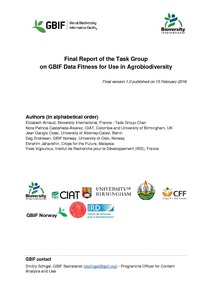Resource information
Human wellbeing and food security in a changing climate depend on productive and
sustainable agriculture. For this, policies based on analyses and research results are vital to
establish conservation priorities of natural resources that underpin the enhancement of
sustainable food production. Therefore, data from agrobiodiversity and wider biodiversity sources
are required to be available and accessible. Currently, there is a risk that agrobiodiversity and the wider biodiversity data communities remain separated with inefficient data aggregation, unless data flow pathways are harmonized. GBIF has a role to play in contributing to the convergence of the two communities. Biodiversity data in particular on wild relatives of the cultivated species will flow easier into agrobiodiversity conservation priority assessments and analysis with agrobiodiversity data integrated in GBIF. The Task Group on Data Fitness for Use in Agrobiodiversity was established by the GBIF
Secretariat and Bioversity International to help improve the fit of data related to agrobiodiversity to the variety of important uses required and requested by the community of research and policy. The task group has been looking at the key actions for creating interoperability of data on ex situ, in situ and on
-farm conservation of agrobiodiversity, with a focus on plants. A survey and interviews of selected experts and ABD data practitioners were conducted to collect feedback on fitness for use and issues with GBIF-
mediated data.


